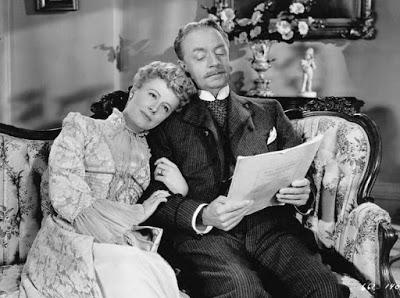Format: Turner Classic Movies on rockin’ flatscreen.

Comedies don’t always transfer well from age to age. Life with Father is a dandy example of this. I imagine that in the world of 1947, with the war over and prosperity just starting to return, a comedy about life in the late 19th century would have sold quite well. Life with Father is just that film, the sort of comedy where our titular father simply can’t fathom the life that goes on around him. While he’s a captain of industry in his office, he is constantly befuddled and confounded by everything around him at home, mainly because no one acts with any sense. It’s a tried and true formula, and because of that, it hits a lot of obvious notes.
What this means, though, is that Life with Father is just a series of events with only the characters to tie them together. There are a few running points that carry through a great deal of the film, but no real plot to speak of. In essence, the entire film is about how the father of the title, Clarence Day (William Powell) can’t make sense of his wife Vinnie (Irene Day) or the goings-on of his four sons, Clarence Jr. (Jimmy Lydon), John (Martin Milner), Whitney (Johnny Calkins), and Harlan (Derek Scott).
Of course, as should be expected in something like this, many of the problems come from Clarence himself. A case in point is his dealing with the constant parade of maids, who seem to last about a day. This happens because he tends to scare them off without meaning to, often by having conversations with people who aren’t there—not in an insane way, but more as a way of voicing his own thoughts. Naturally, he blames the stream of maids leaving his employ on his long-suffering wife.
The main character trait of Clarence Day is that he hates change and wants everything to be run according to the way that he sees things. So, when Vinnie’s cousin Cora (Zasu Pitts) arrives with young Mary (Elizabeth Taylor, who was just 15) in tow to stay for a week, he is completely put out. Clarence Jr. is not, though, since he immediately falls for the charms of young Mary. The two attempt a duet on piano and violin, but discover that while she is a Methodist, he is an Episcopalian, which would constitute a mixed marriage in the late 1800s. Mary realizes, however, that one of her parents was actually baptized an Episcopalian. That night at dinner, hopeful that this interfaith romance can continue, Mary asks Clarence Sr. about his baptism, when he reveals that he never was baptized.
This, believe it or not, will be the main story point for the rest of the film. Vinnie is convinced that without baptism, her husband will be forever spiritually lost and he doesn’t much see the point of going through the procedure. That’s really what constitutes the story.
Oh, there are other story points as well. Clarence Jr. wants a new suit and convinces his father to give him one of his old ones, which he has tailored to fit him. However, once he wears that suit, he feels that he can’t do anything his father would do, like kneel in church. When Mary sits on his lap, he stands up, causing a rift in the budding romance, since his father would never allow something like that to happen. John desperately wants to make money and gets sucked into a scheme selling patent medicines, one bottle of which makes his mother very ill.
Through all of this, Clarence makes a number of promises to be baptized, promises that he immediately rescinds once the crisis is over. He also continually deals with Vinnie’s inability (which might well be faked) to understand even the basics of finances. And eventually the movie ends.
I like William Powell, so on that front, the film wins. In fact, I like a great deal of the cast. Edmund Gwenn plays the family’s minister and he’s generally worth watching in anything. I also tend to like Zasu Pitts and I’m always happy to see her in comic roles. Even a few scenes with her in them are worth seeing. It’s also fun to see Martin Milner this young and before his career in Adam-12.
That said, Life with Father is difficult for me to recommend because it’s kind of a cinematic nothing. It feels like a several-week slice of life out of this family, and while there are certainly comic situations, not much of it is really that funny. It meanders along its way, going nowhere, and then it simply ends abruptly, not all of its scant plot threads resolved. I’m not saying it should have been longer. I am saying it should have been more interesting.
Why to watch Life with Father: A young Martin Milner, and William Powell is always fun.
Why not to watch: There’s no plot here to speak of.
